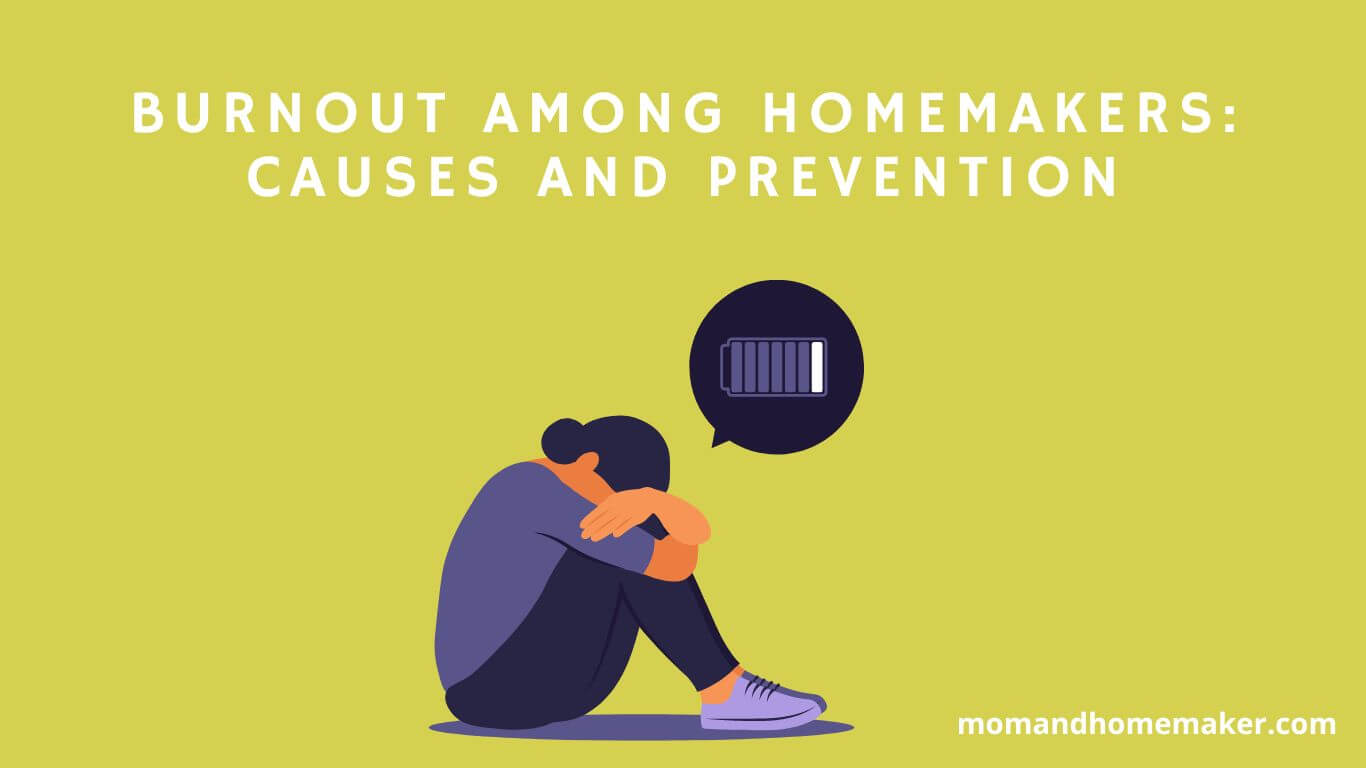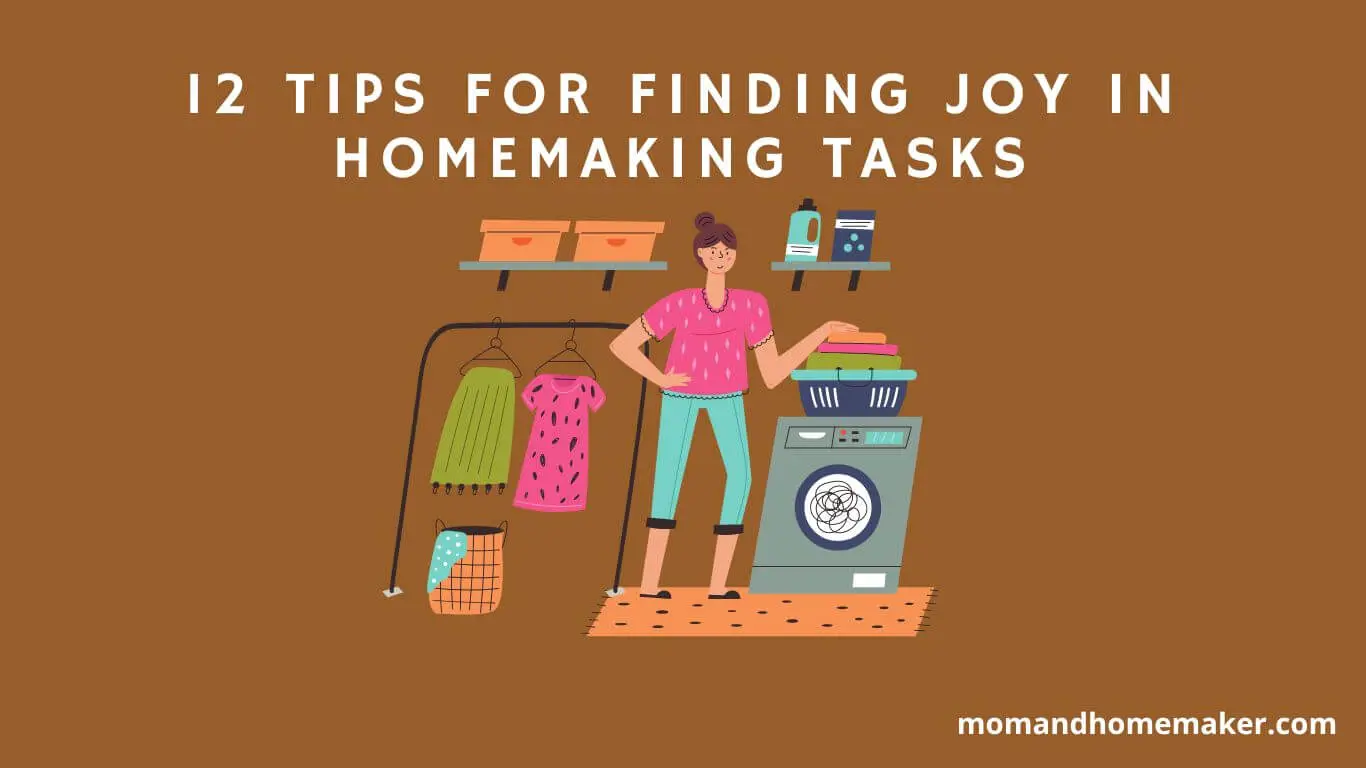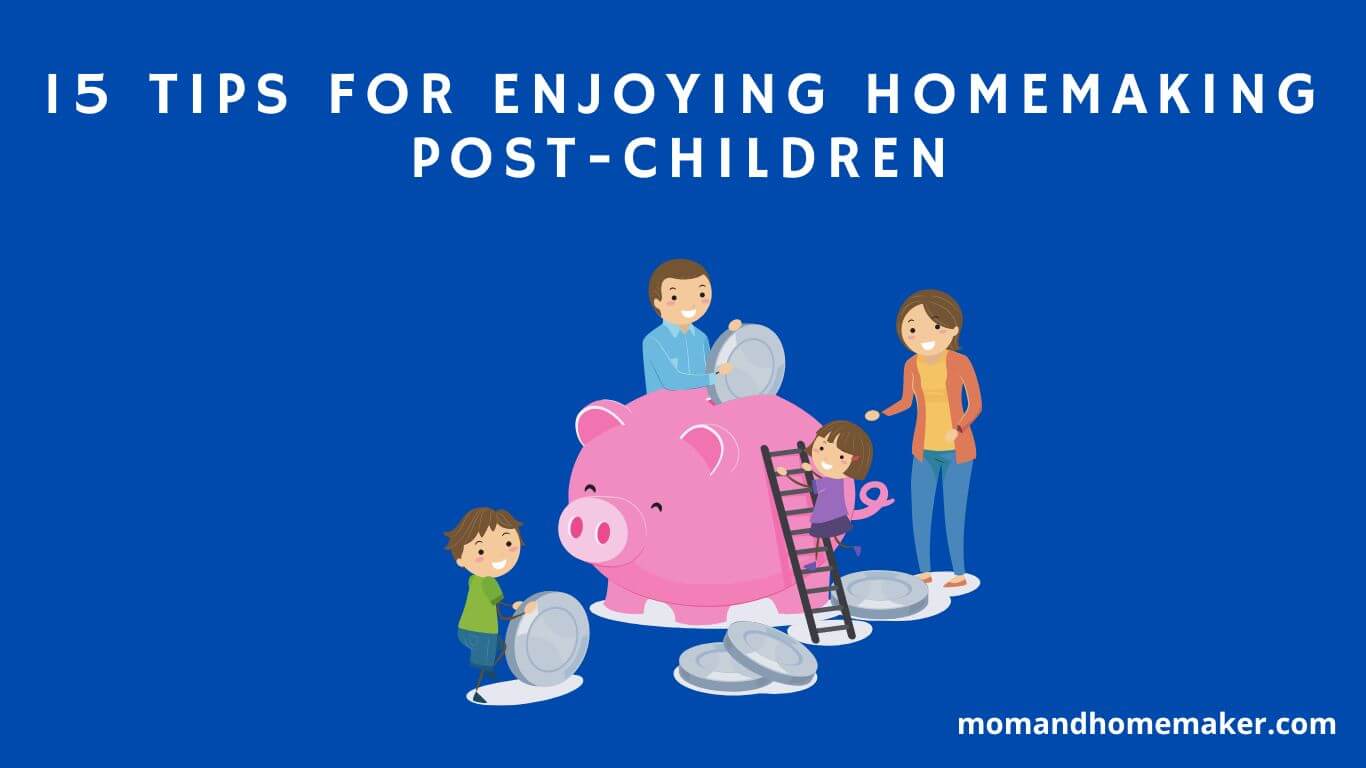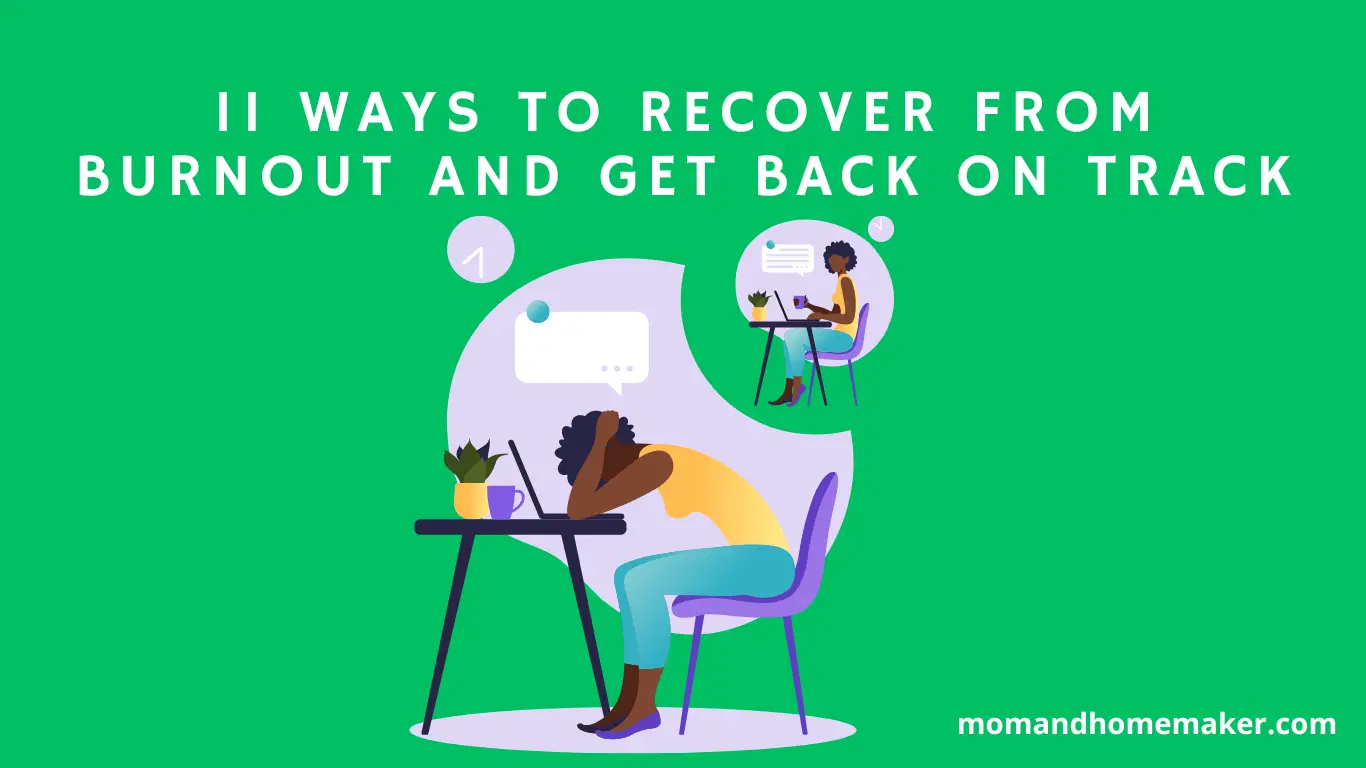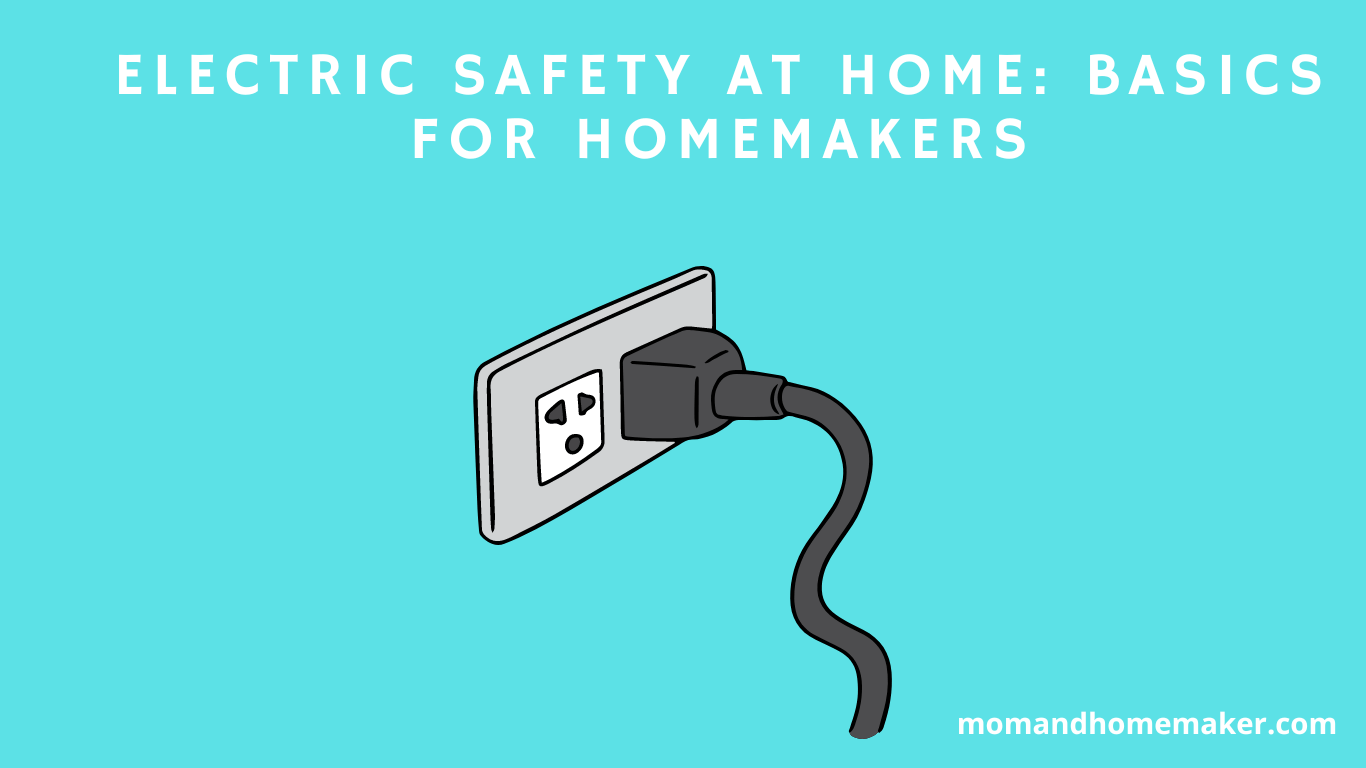Burnout is a state of physical, emotional, and mental exhaustion that can be experienced by individuals of all ages and backgrounds. Homemakers, in particular, can be at risk of burnout due to the unique combination of tasks and responsibilities that come with this role.
The causes of burnout in homemakers can be related to a lack of adequate support, an excessive workload, and unrealistic expectations. Fortunately, several preventative measures can be taken to avoid homemaker burnout and maintain a healthy balance between work and home life. This blog post will explore the causes and prevention of burnout in homemakers in greater detail.

1. 11 Causes of Burnout in Homemakers
1. Lack of Support or Encouragement
Burnout among homemakers is a common occurrence and can be caused by a variety of factors, including a lack of support or encouragement. When a homemaker feels like their efforts are not appreciated or valued, they may quickly become overwhelmed with their responsibilities and begin to feel exhausted.
Without the necessary emotional or practical support from family members, friends, or other resources, homemakers may find themselves feeling isolated, undervalued, and unmotivated. This lack of support can lead to burnout and ultimately result in feelings of resentment, frustration, and hopelessness.
Homemakers need to have someone to turn to for support to avoid feeling overwhelmed and burnt out.
2. Unrealistic Expectations
Unrealistic expectations can be a major source of burnout for homemakers. Society often has an idealized view of a homemaker’s role in the family and in the home, but this idealized view is often not realistic. Homemakers may be expected to perform a wide variety of duties, from meal preparation to cleaning to child care, and they may not have the resources or support they need to accomplish these tasks.
As a result, homemakers may become overwhelmed, exhausted, and even resentful of the unrealistic expectations placed on them. This can lead to burnout, as homemakers may feel like they can never do enough or that their efforts are never enough.
It is important to recognize the reality of a homemaker’s role and to provide the necessary resources and support to help them manage their workload.
3. Overwork
Being a homemaker is a full-time job. Homemakers are often expected to handle a large number of tasks and responsibilities, ranging from childcare to household chores. As a result, homemakers often find themselves overextended, juggling too many tasks and not allowing enough time for relaxation.
This can lead to burnout, where exhaustion and frustration take over, resulting in decreased motivation and productivity. Burnout can occur when homemakers are not able to balance their workload, lack support from family and friends, and lack a sense of control, autonomy, and accomplishment from their work.
Poor time management and difficulty setting boundaries can also contribute to burnout, as homemakers struggle to take on more than they can handle. Homemakers need to prioritize their tasks and set reasonable limits to avoid burnout and manage their workload more effectively.
4. Poor Time Management:
Poor time management can be a major cause of burnout among homemakers. Many homemakers have a never-ending list of tasks and responsibilities that must be completed each day, and when these tasks are not managed properly, it can lead to feelings of exhaustion and overwhelm.
When homemakers fail to plan their days in advance, it can cause them to become overwhelmed with the amount of work that needs to be done, leading to poor time management and eventually burnout. Furthermore, when homemakers are consistently trying to cram too many tasks into a single day, it can lead to a lack of focus and an inability to prioritize effectively, further leading to burnout.
Poor time management can have a serious impact on one’s mental and physical health, so homemakers need to practice good time management and prioritize their tasks accordingly.
5. Financial Stress
Financial stress can be a major contributing factor to burnout in homemakers. The demands of managing a household including meal planning, grocery shopping, paying bills, and managing the family budget can be overwhelming.
In addition, the impact of the economic downturn has meant that homemakers have had to stretch their budgets further and make difficult decisions about which expenses to prioritize. The resulting strain can cause physical and emotional stress that, when not managed, can lead to burnout.
When homemakers do not have time to take care of their own needs, they can become overwhelmed, irritable, and exhausted, leading to burnout. Homemakers need to develop strategies to manage their financial stress, such as creating a budget and seeking help from a financial advisor, to avoid burnout.
6. Lack of Self-Care
Homemakers often take on the responsibility of looking after their family’s needs, which can be both physically and mentally taxing. Without proper self-care, homemakers can become overwhelmed and exhausted, leading to burnout.
Not taking time to rest and replenish can lead to feelings of resentment, fatigue, and lack of motivation, which can all contribute to burnout. Additionally, taking on too much without enough breaks or time to themselves can cause homemakers to become overwhelmed and lose sight of their own needs and self-care.
This can lead to feelings of frustration, guilt, and depression, which can further exacerbate the issue of burnout. Homemakers need to make sure they are taking care of themselves and practicing self-care to avoid burnout and maintain a healthy lifestyle.
7. Unfulfilled Dreams
For many homemakers, unfulfilled dreams can be a major source of burnout. When a homemaker feels as though their passions and dreams have not been achieved, it can leave them feeling unfulfilled and without purpose. They may feel like they are stuck in a rut and unable to make any progress toward their goals.
This can lead to feelings of sadness, depression, and exhaustion which can eventually lead to burnout. To prevent burnout, homemakers should strive to find ways to pursue their passions and dreams, even if it means taking small steps. This can help them to stay motivated and engaged with life, avoiding the all-too-familiar feeling of burnout.
8. Social Isolation
For homemakers, social isolation can be a major cause of burnout. When home life becomes so busy and demanding that there is no time for socialization, homemakers can become overwhelmed and exhausted. When homemakers are unable to interact with others, it can lead to feelings of isolation, loneliness, and boredom. This can lead to a decrease in motivation and energy, making it difficult to complete household and family tasks.
Additionally, social isolation can lead to an overall decrease in mental and emotional well-being, leading to further burnout. It is important for homemakers to take the time to connect with friends, family, and other social circles to prevent burnout from social isolation.
9. Unresolved Conflict
Unresolved conflict can be a major cause of burnout in homemakers. When homemakers are faced with difficult decisions and interpersonal conflicts, they can become overwhelmed and exhausted. Unresolved conflicts can create a tremendous amount of stress and strain on their mental and physical well-being.
Even if the homemaker can resolve the conflict, it can take a long time and require a lot of energy. This can lead to feelings of frustration, anger, and hopelessness, which can eventually lead to burnout. Additionally, unresolved conflict can lead to negative emotions and feelings of isolation, furthering the homemaker’s burnout.
Homemakers need to recognize the signs of burnout and seek help in resolving their conflicts before it becomes too overwhelming.
10. Overcommitment to others
Overcommitment to others can be a major cause of burnout in homemakers. This can include taking on too many duties, such as caring for children, managing a household, cooking, cleaning, and running errands. Homemakers often feel the need to do everything themselves, rather than asking for help or delegating tasks. This can lead to a feeling of being overwhelmed and exhausted.
As the workload continues to pile up, homemakers may eventually feel burned out. To avoid this, it is important to practice self-care and create boundaries so that one does not overextend themselves. Asking for help or delegating tasks to others can also be beneficial.
11. Feeling of being unappreciated
Burnout in homemakers can be caused by a feeling of being unappreciated. When homemakers’ efforts are not noticed or praised, they may start to feel like their job is meaningless or unimportant. This can lead to a lack of motivation and a feeling of exhaustion.
Without a sense of accomplishment or recognition, homemakers may be more likely to experience burnout. By providing words of appreciation and recognizing the hard work of homemakers, we can help to prevent burnout and ensure that they feel supported and valued.
2: How Do You Know If You’re Being Burned Out? Ten ways to find out.
1. Feeling overwhelmed and exhausted
Feeling overwhelmed and exhausted is a common indicator of burnout among homemakers. The daily grind of taking care of the home and family can be exhausting, and when such tasks become too much to handle, it’s easy to feel overwhelmed and exhausted.
This can lead to feelings of depression, anxiety, and a lack of motivation to do anything else. The best way to avoid burnout is to make sure that you get enough rest and take breaks when needed. It’s important to also find time for yourself and make sure that you have some time to just relax and enjoy life. Taking care of yourself is essential to avoid burnout and keep your stress levels down.
2. Lack of motivation when it comes to household tasks
When a homemaker lacks motivation when it comes to household tasks, it is an indication that they are being burned out. This is often the result of being overwhelmed with the numerous responsibilities associated with running a household. This can lead to feelings of exhaustion, frustration, and lack of focus.
The homemaker may find it difficult to complete even mundane tasks, resulting in a backlog of obligations that can be difficult to manage. This can lead to further feelings of burnout and can ultimately lead to negative impacts on the homemaker’s overall well-being, as well as the overall functioning of the household.
Homemakers need to recognize the warning signs of burnout to take steps to prevent it from occurring.
3. Increased stress
Increased stress is a common symptom of burnout for homemakers. When a homemaker is feeling overwhelmed and unable to cope with their day-to-day responsibilities, they often experience increased stress levels. This can manifest itself in physical symptoms such as headaches and fatigue, as well as emotional symptoms such as irritability, anxiety, and depression.
When a homemaker is feeling burned out, it is important to take time to recognize the signs of stress and take proactive steps to manage it, such as talking to a friend, taking a break from household tasks, engaging in self-care activities, and seeking professional help when needed. Being mindful of stress levels is essential for maintaining physical and mental health and preventing burnout.
4. Decreased productivity
Decreased productivity is an indication that a homemaker is being burned out. When a homemaker finds it increasingly difficult to keep up with their usual day-to-day activities, it can be a sign that they are overwhelmed and need to take a break.
This could be seen in the form of a decrease in their ability to plan meals, clean the house, do laundry, or even take care of their children. When a homemaker begins to feel worn down and overworked, they must take the time to rest and recharge to avoid burning out completely.
Taking regular breaks, doing activities that bring joy, and seeking outside help are all helpful strategies that homemakers can utilize to maintain their productivity and keep their spirits up.
5. Apathetic
A homemaker who displays apathetic behavior is likely burned out. Apathy is a state of indifference or lack of motivation, and when a homemaker is feeling this way it is a sign that they have been overworked and their emotional and physical energy reserves have been depleted.
Burnout can occur when a homemaker feels overwhelmed by their responsibilities, or when they have been over-responsible for too long and haven’t taken care of their own needs. When a homemaker is apathetic, they may lack the energy and motivation.
6. Loss of interest in activities
The loss of interest in activities is one of the common signs of burnout for homemakers. When a homemaker begins to lose interest in activities that they usually enjoy and that bring them joy, it is a sign that they are beginning to experience burnout.
It is important to take notice of this and to take steps to help the homemaker regain their energy and enthusiasm. This may be accomplished by taking breaks from their responsibilities, seeking out help from family or friends, or engaging in different activities that help to bring back their interests and energy.
Taking care of oneself is the key to avoiding burnout and helping the homemaker to keep up with the important work that they do for the family.
7. Trouble sleeping
Trouble sleeping is often an indication that a homemaker is being burned out. The stress of managing a home and taking care of the family can lead to insomnia, which can leave a homemaker feeling exhausted and overwhelmed.
When a homemaker is overwhelmed and exhausted, they may have difficulty falling asleep, staying asleep, and/or waking up feeling refreshed and ready to start the day. This can lead to feelings of frustration and fatigue, and can ultimately affect the homemaker’s ability to successfully manage their home and take care of their family.
Homemakers need to recognize the signs of burnout and take steps to reduce stress and get adequate rest. Taking regular breaks throughout the day, scheduling time to enjoy activities that bring joy, and establishing healthy sleep habits are all great ways to ensure that homemakers are getting the rest they need to stay healthy and well-rested.
8. Having difficulty concentrating
When a homemaker is having difficulty concentrating, this is a strong indication that they are being burned out. The stress and exhaustion of managing a household can be overwhelming and cause feelings of being overwhelmed and overwhelmed.
This can lead to a lack of focus and the inability to concentrate on the tasks at hand. Homemakers can become overwhelmed with trying to juggle all the roles they have to take on and can end up feeling burnt out and frustrated. Homemakers need to recognize the signs of burnout and take action to reduce stress and improve their mental and emotional well-being.
Taking regular breaks and engaging in activities that are enjoyable and relaxing can help to provide much-needed respite and improve focus and concentration.
9. Experiencing frequent mood swings
Experiencing frequent mood swings is a strong indication that a homemaker is being burned out. It can be overwhelming to have to juggle all the responsibilities of managing a home, such as providing meals, keeping the house clean, doing laundry, and more.
When a homemaker is burning out, they may start to feel exhausted and overwhelmed by the number of tasks they need to complete and their frequent mood swings are a sign that this is the case. If a homemaker is experiencing frequent mood swings, they must take some time for themselves to relax and recharge.
This could include taking a break from the household chores, scheduling time for self-care activities, such as getting a massage or going for a walk, and ensuring that they get enough sleep.
10. Feeling like nothing is ever accomplished
The feeling that nothing is ever accomplished is a sign of burnout for homemakers. With all the responsibilities that come with being a homemaker, it is easy to become overwhelmed and exhausted. This can lead to a sense of apathy, in which it seems like no matter how hard you work, nothing is ever completed or improved.
This can be discouraging and can leave a homemaker feeling unmotivated, unfulfilled, and unappreciated. To combat this, it is important to take regular breaks and focus on the small accomplishments that add up over time.
Taking time to appreciate the successes, no matter how small, can help a homemaker feel more accomplished and less burned out.
4. Five ways to Prevent Burnout
1. Establish boundaries
Establishing boundaries is essential for preventing burnout among homemakers. Setting clear boundaries around work hours, tasks, and expectations will help ensure that homemakers are taking care of themselves and not overextending themselves.
This could include setting a designated time for when you will finish all of your tasks for the day, taking regular breaks throughout the day, and setting realistic goals for yourself. Additionally, it may be helpful to establish boundaries with family members, friends, and other caregivers to prevent burnout.
For example, it may be beneficial to set clear expectations for everyone in terms of who is responsible for which tasks or to establish a system of support when a homemaker is feeling overwhelmed. Finally, it is important to practice self-care, such as getting adequate rest, eating healthy, taking walks, and engaging in activities that bring joy.
By establishing boundaries and taking regular breaks, homemakers can prevent burnout and better take care of themselves.
2. Take breaks
Taking breaks can help homemakers prevent burnout. Breaks provide an opportunity to rest and rejuvenate, allowing homemakers to return to their tasks with renewed energy and motivation. Breaks can take many forms, from taking a walk outside to reading a book or calling a friend.
Taking a break can help homemakers clear their minds, allowing them to refocus on their tasks and remain productive. Additionally, breaks allow homemakers to do something for themselves, which can help them feel more fulfilled and content.
Even taking a few moments to relax, take a deep breath, and gather one’s thoughts can be incredibly beneficial, and can help homemakers prevent burnout.
3. Ask for help
Asking for help is an important way for homemakers to prevent burnout. It can be hard to admit that you need someone else’s assistance, but it’s essential to prioritize your own mental and physical well-being. Having someone to help with tasks can reduce the burden of all the work that needs to be done.
This can provide some much-needed relief and allow you to focus on self-care. From getting a friend to take the kids to the park for a few hours, to enlisting a family member to help with grocery shopping, you can find people willing to lend a hand. Asking for help is a sign of strength, not weakness, and can help prevent burnout in homemakers.
4. Practice self-care
Practicing self-care is essential for homemakers to prevent burnout. Self-care can include taking time to do activities that bring joy, such as reading a good book, going for a hike, or taking a yoga class. It can also involve taking time to rest and relax by taking a nap, getting a massage, or indulging in some other form of self-care.
Taking time for self-care can help reduce stress, improve overall mental and physical health, and help prevent burnout. Homemakers need to make sure that they are taking care of themselves and not neglecting their own needs. Self-care can be an important part of maintaining balance in their lives and preventing burnout.
5. Prioritize tasks
Prioritizing tasks is an important tool for homemakers to prevent burnout. Homemakers often have a lot of responsibilities that they need to manage, and it can be hard to find the time and energy to do it all. By prioritizing tasks, homemakers can focus on the most important tasks first, and then move on to the less important tasks later.
This allows them to maximize their energy and time, so they don’t feel overwhelmed with too many tasks. Additionally, prioritizing tasks helps homemakers to be more organized, which can make them more efficient in completing their tasks. Therefore, prioritizing tasks is an effective way for homemakers to prevent burnout and ensure that their responsibilities are taken care of.
Conclusion
Burnout among homemakers is a serious issue that should not be taken lightly. It can be caused by several factors, such as stress, exhaustion, lack of recognition, and unrealistic expectations. Fortunately, there are a few steps that can be taken to prevent burnout in homemakers, including setting boundaries, taking breaks, and seeking help and support when needed. With the right combination of self-care, communication, and support, burnout can be prevented and managed, allowing homemakers to lead more balanced and fulfilling lives.

